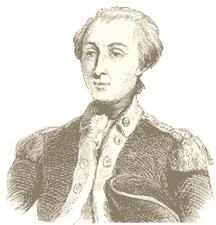Marie Jean Paul Joseph Roche Yves Gilbert du Motier, the Marquis de Lafayette, was born in Auvergne, France, into a family with a long history of service to the State.
He entered the French army at an early age, rising to the rank of captain. Lafayette shared with many of his countrymen an enthusiasm for the ideals put forth in America's Declaration of Independence, and with typical bravado he invested his own funds to outfit a ship and sailed for America in April 1777. He landed in South Carolina then headed north to join the forces of George Washington, with whom he established a lasting friendship during the travails at Valley Forge.  Serving as an unpaid volunteer on Washington's staff, Lafayette was wounded at Brandywine and served later at Monmouth and in New Jersey. He advocated a joint French and American invasion of Quebec, but the French were non-commital and the Second Continental Congress referred the question to Washington, he argued that it was a bad strategy, and the plan came to nought.
Lafayette's continued service was rewarded with a promotion to major general, but in 1779 he returned to France to promote America's interests. Later in 1779, Lafayette returned, bearing news of imminent French naval aid. He also served on the board of judges that condemned the spy, John André.
In 1781, Lafayette led American forces in Virginia against both Benedict Arnold and Lord Cornwallis. Once again, he returned to France and served as a diplomatic aid to Benjamin Franklin during the peace negotiations.
Lafayette played a prominent role in the early stages of the French Revolution, but was removed by the Jacobins for alleged moderation. He went on to a series of turbulent experiences during the Reign of Terror, the Napoleonic Era and the Restoration.
Lafayette made his final visit to America in 1824-25 and was received with great adulation and enthusiasm. The U.S. Congress provided him with a cash gift of $200,000 in appreciation of his valuable services.
Serving as an unpaid volunteer on Washington's staff, Lafayette was wounded at Brandywine and served later at Monmouth and in New Jersey. He advocated a joint French and American invasion of Quebec, but the French were non-commital and the Second Continental Congress referred the question to Washington, he argued that it was a bad strategy, and the plan came to nought.
Lafayette's continued service was rewarded with a promotion to major general, but in 1779 he returned to France to promote America's interests. Later in 1779, Lafayette returned, bearing news of imminent French naval aid. He also served on the board of judges that condemned the spy, John André.
In 1781, Lafayette led American forces in Virginia against both Benedict Arnold and Lord Cornwallis. Once again, he returned to France and served as a diplomatic aid to Benjamin Franklin during the peace negotiations.
Lafayette played a prominent role in the early stages of the French Revolution, but was removed by the Jacobins for alleged moderation. He went on to a series of turbulent experiences during the Reign of Terror, the Napoleonic Era and the Restoration.
Lafayette made his final visit to America in 1824-25 and was received with great adulation and enthusiasm. The U.S. Congress provided him with a cash gift of $200,000 in appreciation of his valuable services.